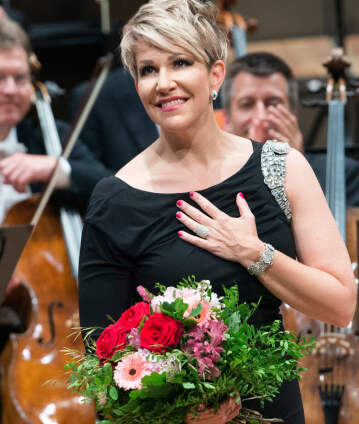Ludovic Morlot and Joyce DiDonato

Hector Berlioz’s cantata La Mort de Cléopâtre is a highly concentrated drama of sometimes delicate, sometimes overwhelming expressiveness. Mezzo-soprano Joyce DiDonato sang the work in June 2017 and was acclaimed by the audience for her powerful stage presence. Conductor Ludovic Morlot also presented Maurice Ravel’s charming suite Ma Mère l’Oye and Igor Stravinsky’s pioneering ballet music The Firebird.
“Monsieur, I would never have thought that a composer would have to avoid new means of expression if he has the good fortune that they occur to him, and when they fit in the context,” Hector Berlioz protested in a discussion with François-Adrien Boieldieu, member of the jury at the Conservatoire de Paris. Once again he had not been awarded the Prix de Rome, the sought-after scholarship for budding composers. The cantata he had submitted, La Mort de Cléopâtre, which traces the desperate moments before the Egyptian queen’s suicide and musically accompanies each and every stirring in the soul with expressive harmonies and unusual rhythms, outraged the conservative teachers in its progressivity. In this programme, the mezzo-soprano Joyce DiDonato lends Cleopatra her voice. The American already proved that she is an ideal Berlioz interpreter as Marguerite at the performance of the dramatic legend La Damnation de Faust that Sir Simon Rattle conducted in 2015. Her “radiant swells” and “silver-saturated highs” enchanted the audience and the press.
While Berlioz had to struggle for his works to be recognised even in later years, another composer took Paris by storm: Igor Stravinsky, whom Sergei Diaghilev, the enterprising and savvy impresario of the Ballets russes, commissioned in 1910 to compose a ballet based on the old Russian folk tale The Firebird. In fact, it was intended that Anatoly Lyadov wrote the music to it, but he didn’t deliver, and thus in direst need Diaghilev approached Stravinsky, who was 27 at the time and still completely unknown. A stroke of good fortune in music history, because Stravinsky created a composition full of rhythmic power, shimmering timbres and surprising orchestral effects which inspired the Paris audience to thunderous applause and made the young Russian the leading ballet composer of his time virtually overnight.
Only a few weeks earlier, Maurice Ravel achieved such a success with his piano suite Ma Mère l’Oye, inspired by several stories from Charles Perrault’s fairy-tale collection, that he decided to orchestrate the work and expand it to an orchestral suite and a ballet version. In this work, Ravel makes use of a completely different musical language than the “wild” Russian: dreamy, archaic, tender. The conductor of this programme is Ludovic Morlot, who stands in for an indisposed Yannick Nézet-Séguin. Born in France, Morlot has been music director of the Seattle Symphony since 2011 and makes his debut with the Berliner Philharmoniker in this concert.
© 2017 Berlin Phil Media GmbH
Related interviews
Artists
Our recommendations
- “La Damnation de Faust” with Simon Rattle, Joyce DiDonato and Charles Castronovo
- 2017 New Year’s Eve Concert with Simon Rattle and Joyce DiDonato
- Daniel Harding and Gerald Finley with works by Schubert and Strauss
- Karajan conducts Beethoven’s Symphonies Nos. 3 & 7
- Karajan conducts Brahms’s Symphonies Nos. 1–4
- 2007 Europakonzert from Berlin with Simon Rattle, Lisa Batiashvili and Truls Mørk